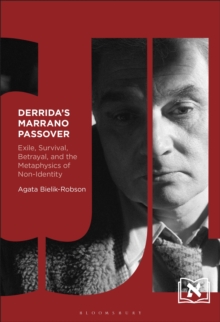Description
| Product ID: | 9781501392610 |
| Product Form: | Hardback |
| Country of Manufacture: | GB |
| Series: | Comparative Jewish Literatures |
| Title: | Derrida's Marrano Passover |
| Subtitle: | Exile, Survival, Betrayal, and the Metaphysics of Non-Identity |
| Authors: | Author: Agata Bielik-Robson |
| Page Count: | 296 |
| Subjects: | Literary studies: c 1900 to c 2000, Literary studies: from c 1900 -, Literary studies: fiction, novelists and prose writers, Western philosophy from c 1800, Judaism, Literary studies: fiction, novelists & prose writers, Western philosophy, from c 1900 -, Judaism |
| Description: | In this first ever monograph on Jacques Derrida’s ‘Toledo confession’ – where he portrayed himself as ‘sort of a Marrano of the French Catholic culture’ – Agata Bielik-Robson shows Derrida’s marranismo to be a literary experiment of auto-fiction. She looks at all possible aspects of Derrida’s Marrano identification in order to demonstrate that it ultimately constitutes a trope of non-identitarian evasion that permeates all his works: just as Marranos cannot be characterized as either Jewish or Christian, so is Derrida’s ‘universal Marranism’ an invitation to think philosophically, politically and – last but not least – metaphysically without rigid categories of identity and belonging. By concentrating on Derrida’s deliberate choice of marranismo, Bielik-Robson shows that it penetrates deep into the very core of his late thinking, constantly drawing on the literary works of Kafka, Celan, Joyce, Cixous and Valéry, and throws a new light on his early works, most of all: Of Grammatology, Dissemination and 'Différance'. She also offers a completely new interpretation of many of Derrida’s works only seemingly non-related to the Marrano issue, like Glas, Given Time: Counterfeit Money, Death Penalty Seminar, and Specters of Marx. In these new readings, this book demonstrates that the Marrano Derrida is not a marginal auto-biographical figure overshadowed by Derrida the Philosopher: it is one and the same thinker who discovered marranismo as a literary trope of openness, offering up a new genre of philosophical story-telling which centers around Derrida’s Marrano ‘auto-fable’. In this first ever monograph on Jacques Derrida’s ‘Toledo confession’ – where he portrayed himself as ‘sort of a Marrano of the French Catholic culture’ – Agata Bielik-Robson shows Derrida’s marranismo to be a literary experiment of auto-fiction. She looks at all possible aspects of Derrida’s Marrano identification in order to demonstrate that it ultimately constitutes a trope of non-identitarian evasion that permeates all his works: just as Marranos cannot be characterized as either Jewish or Christian, so is Derrida’s ‘universal Marranism’ an invitation to think philosophically, politically and – last but not least – metaphysically without rigid categories of identity and belonging.By concentrating on Derrida’s deliberate choice of marranismo, Bielik-Robson shows that it penetrates deep into the very core of his late thinking, constantly drawing on the literary works of Kafka, Celan, Joyce, Cixous and Valéry, and throws a new light on his early works, most of all: Of Grammatology, Dissemination and ''Différance''. She also offers a completely new interpretation of many of Derrida’s works only seemingly non-related to the Marrano issue, like Glas, Given Time: Counterfeit Money, Death Penalty Seminar, and Specters of Marx. In these new readings, this book demonstrates that the Marrano Derrida is not a marginal auto-biographical figure overshadowed by Derrida the Philosopher: it is one and the same thinker who discovered marranismo as a literary trope of openness, offering up a new genre of philosophical story-telling which centers around Derrida’s Marrano ‘auto-fable’. |
| Imprint Name: | Bloomsbury Academic USA |
| Publisher Name: | Bloomsbury Publishing Plc |
| Country of Publication: | GB |
| Publishing Date: | 2023-01-12 |


